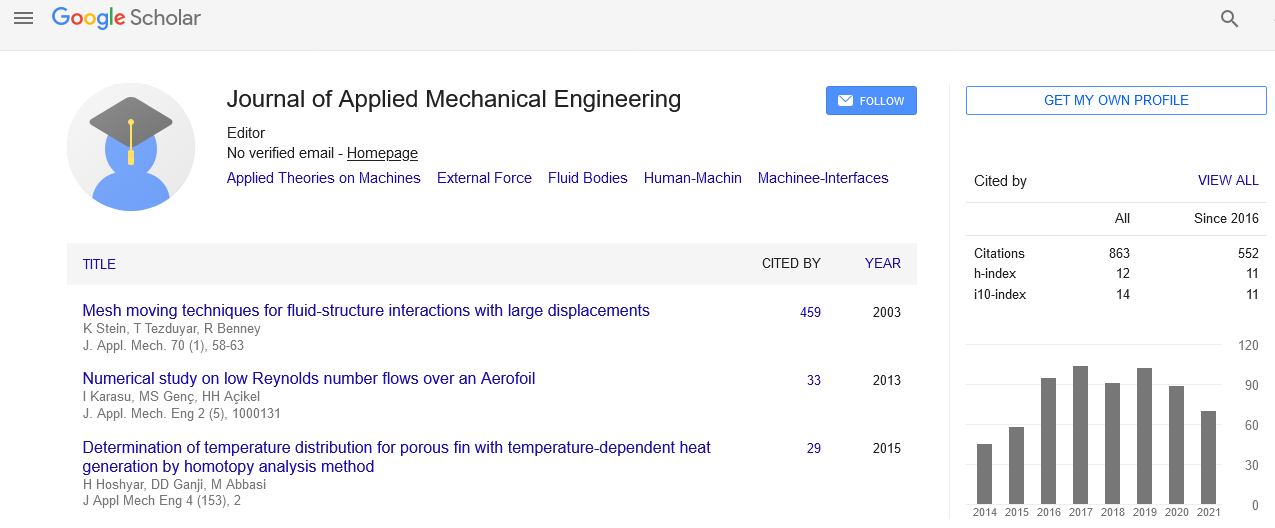Indexed In
- Genamics JournalSeek
- JournalTOCs
- CiteFactor
- RefSeek
- Hamdard University
- EBSCO A-Z
- OCLC- WorldCat
- Publons
- Google Scholar
Useful Links
Share This Page
Journal Flyer

Open Access Journals
- Agri and Aquaculture
- Biochemistry
- Bioinformatics & Systems Biology
- Business & Management
- Chemistry
- Clinical Sciences
- Engineering
- Food & Nutrition
- General Science
- Genetics & Molecular Biology
- Immunology & Microbiology
- Medical Sciences
- Neuroscience & Psychology
- Nursing & Health Care
- Pharmaceutical Sciences
Perspective - (2023) Volume 12, Issue 4
Understanding the Intrigues of Energy and Heat with Thermodynamics in Mechanical Engineering
Jeremy Pierre Hickey*Received: 03-Jul-2023, Manuscript No. JAME-23-22326; Editor assigned: 05-Jul-2023, Pre QC No. JAME-23-22326(PQ); Reviewed: 19-Jul-2023, QC No. JAME-23-22326; Revised: 26-Jul-2023, Manuscript No. JAME-23-22326(R); Published: 02-Aug-2023, DOI: 10.35248/2168-9873.23.12.492
Description
One of the main foundations that regulate how energy and heat behave in diverse systems is thermodynamics. Thermodynamics has a significant impact on how the contemporary world functions, from the engines that drive our cars to the complicated processes of electricity production and refrigeration. The fundamentals of energy conversion, heat transmission, and the connection between work and heat are explored in-depth by this field, giving engineers the skills they need to build and optimise a variety of mechanical systems. This essay will go into the fascinating realm of thermodynamics in mechanical engineering, including its fundamental ideas, practical uses, and significance contribution to driving advancement in society.
Fundamentals principles of thermodynamics
The study of energy and heat transmission in mechanical systems is at the heart of thermodynamics. It is built on four fundamental rules that serve as a framework for comprehending how energy and heat behave:
According to the Zeroth law of thermodynamics two systems are in thermal equilibrium with one another if they are both individually in thermal equilibrium with a third system. The building of temperature scales and the measurement of temperature are both based on this law. According to the first law of thermodynamics (Conservation of Energy), energy can only change forms; it cannot be generated or destroyed. It draws attention to the energy-conservation concept, which states that the total energy of an isolated system stays constant. Comprehension energy conversions and transfers in mechanical systems require a comprehension of this law.
The second law of thermodynamics deals with the idea of entropy, which is a measurement of how much energy in a system, is no longer usable for productive labour. It asserts that the overall entropy of a system and its surroundings constantly rises throughout any natural process. This legislation offers information about the course and effectiveness of energy transformations.
The third law of thermodynamics is concerned with how a system behaves when it approaches the temperature of absolute zero. According to this, a flawless crystal's entropy decreases as the temperature gets closer to zero. The third law is important for comprehending how matter behaves at extremely low temperatures, despite not being used as frequently as the other two principles.
Applications of thermodynamics in mechanical engineering
Mechanical engineers can build, examine, and optimize systems for effective energy use in a variety of sectors of the discipline. The conversion of heat energy from burning fossil fuels or nuclear processes into mechanical energy to generate electricity is governed by thermodynamics in thermal power plants. It's essential to comprehend thermodynamic cycles like the rankine cycle when constructing effective power production systems. Internal combustion engines, such as those seen in vehicles and aeroplanes, depend heavily on thermodynamics to function properly. Gas compression, combustion, and expansion concepts are essential for maximising engine performance and efficiency. To regulate temperature and maintain thermal comfort, refrigeration and air conditioning systems move heat from one location to another using the principles of thermodynamics.
Steam and gas turbines: Steam and gas turbines, which are widely used in the power generating and aviation sectors, employ thermodynamic principles to transform heat energy into mechanical work, which drives turbines to create electricity. Heat exchangers are significance parts of many mechanical systems because they transfer heat between fluids, improving energy efficiency and heat management. In the field of fluid mechanics, analysis of fluid flow operations like pumps, compressors, and nozzles using thermodynamics is used to examine how energy is transferred.
Energy efficiency in thermodynamics
The need for energy-efficient solutions to lessen the effects of climate change and encourage sustainable development is one of the major problems that mankind is now confronting. In this aim, engineers use thermodynamics extensively to optimise energy conversion procedures and reduce waste. Engineers may develop and use technologies that use less energy while producing the intended results by understanding the thermodynamic efficiency of systems. Thermodynamic analysis may help increase the effectiveness of industrial, transportation, and power generating systems, which can cut greenhouse gas emissions and make our planet's future more sustainable.
Challenges in future prospects
As technology develops, new possibilities and difficulties in thermodynamics arise. Innovative techniques to thermodynamic analysis and design are necessary for the development of alternative energy sources including renewable energy and hydrogen-based technology. As a result of developments in materials science and nanotechnology, it is now possible to explore thermodynamic behaviour at the nanoscale and create new energy-efficient technologies. Thermodynamics will continue to be a key factor in determining the direction of mechanical engineering as firms work to comply with more demanding energy efficiency requirements and environmental restrictions.
Conclusion
Thermodynamics is the foundation of energy conversion and heat transfer processes in mechanical engineering, enabling breakthroughs in power production, transportation, and industrial applications.
Engineers are given a thorough grasp of the behaviour of energy by the fundamental rules of thermodynamics, which enables them to develop effective and long-lasting systems.
Citation: Hickey JP(2023) Understanding the Intrigues of Energy and Heat with Thermodynamics in Mechanical Engineering. J Appl Mech. 12:492.
Copyright: © 2023 Hickey JP. This is an open-access article distributed under the terms of the Creative Commons Attribution License, which permits unrestricted use, distribution, and reproduction in any medium, provided the original author and source are credited.

